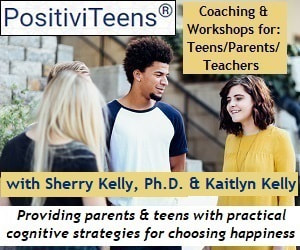Healthy Mind
The Emotional First Aid Kit for College
|
Special Issue Sponsors:
Section Sponsor:
|
Why is this so important? Because very often your unhappiness and distress in college will arise from situations where your expectations did not sync with how things really turned out, or how other people behaved.
2) Have a discussion with your parents BEFORE you go to college about their expectations versus your expectations about college. Keep in mind that the expectations your parents have for you may be very different than the expectations you have for yourself. Clarify what your parents expect of you in terms of your academic life, work life, social life, and how often they expect you to check in with them.
2) Have a discussion with your parents BEFORE you go to college about their expectations versus your expectations about college. Keep in mind that the expectations your parents have for you may be very different than the expectations you have for yourself. Clarify what your parents expect of you in terms of your academic life, work life, social life, and how often they expect you to check in with them.
3) Clarify expectations about finances with your parents before you head off to campus. One of you, or both of you, might have very different expectations about the costs associated with attending college. This also means being upfront with the amount of money you expect to need for your living expenses and social life – not just the cost of attending college.
4) Expect to change friend groups and become socially agile. Do not expect your roommate to become your best friend? Prepare for your roommate/suitemates to have their own friends and for there to be times you may not be included. It’s important to seek connections with many students from different backgrounds to establish a varied social support network during the first year. The personal boundaries you do establish with your roommate will be largely based on the expectations you have for each other.
4) Expect to change friend groups and become socially agile. Do not expect your roommate to become your best friend? Prepare for your roommate/suitemates to have their own friends and for there to be times you may not be included. It’s important to seek connections with many students from different backgrounds to establish a varied social support network during the first year. The personal boundaries you do establish with your roommate will be largely based on the expectations you have for each other.
5) Prepare for needing support at some point. Most campuses have a student services/student affairs office which can direct you to resources that are available to you – counseling and other health services, tutoring, residential services, etc. Some studies estimate that 40% of college students will, at some point, feel so anxious or overwhelmed that they can’t even go to class. Understand that sometimes discomfort is a signal to grow, and that growth arises from discomfort. Be open to seeking support during times of distress and know how to access that help on campus before you actually need it.
6) Get involved early with extracurricular activities, clubs, and campus organizations. This is one of the best ways to meet a wide variety of students to garner the social support needed during your first year. Also, many leadership positions offered to upperclassmen are filled by students who joined during their first year. This is your opportunity to get experience in leadership or community involvement that will help you land an internship or job.
7) Go to college with a purpose, not by accident! One of the biggest mistakes students make is taking a “let’s see what happens” or a passive approach to the university experience. If you have your sights set on a destination or specific goals, it will be easier to identify opportunities and to make the right decisions.
8) Do not depend on your advisor to give you advice! Most academic advisors today serve as gatekeepers for courses and do not actually “advise.” For advice about your major, internship opportunities, and important academic decisions, establish a relationship with one of your teachers or a department chair. Everyone in college should have a mentor to help with important decisions about the college journey – it does not have to be the one assigned to you. Instead, work to make connections with those faculty members who can provide unique insights and solid advising.
9) Make friends with students who are a grade or two above you. Older students have insights about teachers and courses that are popular, as well as the ones to avoid. They also provide important perspectives about navigating life on campus that younger peers do not yet have.
10) Be prepared for people trying to reinvent themselves during the first year at college. For many students, the first year of college is a chance to reinvent themselves. So, be prepared for someone who might be heavily invested in seeing you as an audience for their drama, or to even invent some persona to impress you. Don’t take it personally; instead, realize that everyone has their own way of coping with the stress of life changes.
Finally, be kind to yourself and remember that college is not a competition. It is a great time, however, to get out of your comfort zone and try to experience new situations that will lead to an abundance of opportunities. Do not be afraid. Be excited!
6) Get involved early with extracurricular activities, clubs, and campus organizations. This is one of the best ways to meet a wide variety of students to garner the social support needed during your first year. Also, many leadership positions offered to upperclassmen are filled by students who joined during their first year. This is your opportunity to get experience in leadership or community involvement that will help you land an internship or job.
7) Go to college with a purpose, not by accident! One of the biggest mistakes students make is taking a “let’s see what happens” or a passive approach to the university experience. If you have your sights set on a destination or specific goals, it will be easier to identify opportunities and to make the right decisions.
8) Do not depend on your advisor to give you advice! Most academic advisors today serve as gatekeepers for courses and do not actually “advise.” For advice about your major, internship opportunities, and important academic decisions, establish a relationship with one of your teachers or a department chair. Everyone in college should have a mentor to help with important decisions about the college journey – it does not have to be the one assigned to you. Instead, work to make connections with those faculty members who can provide unique insights and solid advising.
9) Make friends with students who are a grade or two above you. Older students have insights about teachers and courses that are popular, as well as the ones to avoid. They also provide important perspectives about navigating life on campus that younger peers do not yet have.
10) Be prepared for people trying to reinvent themselves during the first year at college. For many students, the first year of college is a chance to reinvent themselves. So, be prepared for someone who might be heavily invested in seeing you as an audience for their drama, or to even invent some persona to impress you. Don’t take it personally; instead, realize that everyone has their own way of coping with the stress of life changes.
Finally, be kind to yourself and remember that college is not a competition. It is a great time, however, to get out of your comfort zone and try to experience new situations that will lead to an abundance of opportunities. Do not be afraid. Be excited!
|
Kaitlyn E. Kelly is co-founder of PositiviTeens®, contributing editor for Meaningful Paths (UK), Global Youth Ambassador for the Mental Wellness Society-International, and a student at the University of Notre Dame (Class of 2026). As a dedicated mental health advocate and community leader, she has co-presented PositiviTeens® webinars to audiences in the United States and abroad.
|









